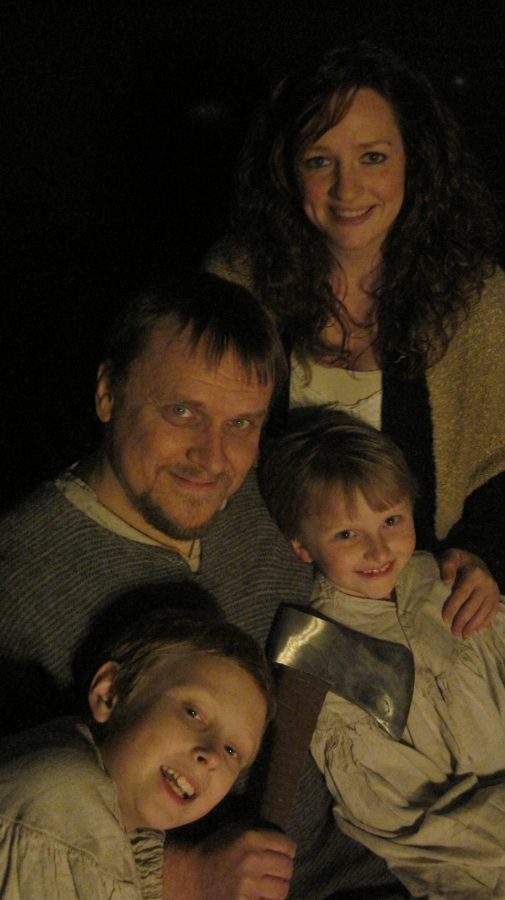
Jessica Cavanaugh, Wm. Paul Williams, Stuart Williams and Lily McCollum star in Echo’s current show “The Executioner’s Sons” which runs through Saturday, Feb 19. (Photo Courtesy of Echo Theatre)
In the late 80’s and early 90’s, the Dallas theater scene was thriving. Small companies and theater spaces were materializing in neighborhoods throughout the city, from the experimental Deep Ellum Theater Garage to the more contem-porary Classic Theatre Company among others.
But Linda Marie Ford was having a hard time finding anyone who would produce a play that had caught her attention – “Dreams of a Common Language” by Heather McDonald.
The glass ceiling had long since been shattered and the Judith Shakespeare’s of the world had rooms of their own, but Ford was finding that plays written by women about women were being brushed off with the remark, “it’s not our kind of thing.”
“She just got a bee in her bonnet about the whole thing,” Pam Myers-Morgan said. “It was never my intention to run a theater, but there was this undeniable need to produce female work.”
In 1997, Myers-Morgan and Suzy Blalock joined Ford in founding Echo Theatre, a company committed to the production of plays written by women.
By 1998, they received non-profit status and produced “Dreams of a Common Language” themselves at The Basement Space. The past 13 years have seen Echo find a home in the Bath House Cultural Center and produce 126 shows.
The egalitarian manner in which Echo conducts its business has allowed smooth transitions as producing partners have come and gone.
Currently Kateri Cale and Terri Ferguson work with Myers-Morgan to keep Echo alive, a partnership that all three women praise.
“We love working with each other, because no one person makes a decision,” Cale said. “We all have areas we tend to gravitate towards.”
Cale was the impetus behind the Big Shout Out playwriting competition, from which they found their current season. The competition received 350 submissions, which was eventually narrowed down to seven finalists and three winners.
With the Wasserstein Prize unable to find a satisfactory playwright this past year and many theater companies going without a single female work in their season, the turnout was an inspiration for Echo.
“What keeps it fresh, is that it’s not getting better,” Myers- Morgan said. “Our plays always get the same reaction, ‘where did you find that script and those actors?’ I wish more cities had an Echo Theatre for that reason.”
Sticking to their strong mission statement and having steadfast leaders is not the only thing that Echo is doing right. According to a study recently released by Creative Time, they’re also benefiting the Dallas arts scene by being a small company that is involved in the community in which they perform.
David Fisher, the assistant director of the Office of Cultural Affairs, said Echo’s involvement at the Bath House beyond their own productions has bolstered the success of other artistic endeavors that take place there.
“We really couldn’t ask for a better partner,” Fisher said. “They’ve produced such good, consistent work over the years that their audience will now go see other shows that are put up in the center.”
It is the quality of Echo’s work that has garnered them the respect of the theater community at large. Alexandra Bonifield, a local arts advocate and theater critic, has had their plays on several of her top productions of the year list.
“The fact that they have both the knowledge and understanding of theater and the commitment to the role that females play as artists, and as 50 percent of our culture – if just for that they deserve praise,” Bonifield said.
Echo mounts two main stage productions per season, as well as a series called Echo Reads, which is a set of staged readings. In addition, Echo participates in the Festival of Independent Theatre and has been the only company to take part in all 11 years.
With a mission statement that reads that they are trying to “unearth the power of the female theatrical voice,” they are often categorized as a women’s interest theater, which is not the case.
“Most women’s theater companies tend to be very feminist,” Ferguson said.
“People tend to view us as feminists, which they see as a criticism of what we do,” Myers- Morgan said. “But the only limitation is that we produce work of female playwrights.”
“We do plays by women,” Ferguson said.
“Our mission statement could not be more pure,” Cale said. “Our plays are as diverse as the women in the world.”
Their current show is “The Executioner’s Sons” by Catherine Bush, a play about the head executioner of the Tower of London and his family in the 15th century.
It was a winner of the Big Shout Out contest and has received positive feedback from most Dallas critics.
Up next on their schedule is a staged reading of a future production “The Early Education of Conrad Eppler” by Isabella Russell-Ides, followed by their contribution to the Horton Foote Festival, a play written by his daughter Daisy Foote, “Bhutan.”
“Art should have more freedom, yet do it as part of a community,” Myers-Morgan said. “Echo has always been about more than aren’t I a good director and don’t I act pretty?”
“The Executioner’s Sons” has its final performances Friday and Saturday at 8 p.m.
“The Early Education of Conrad Eppler” has a one-night performance Tuesday, March 22.
For more information visit, echotheatre.org.









